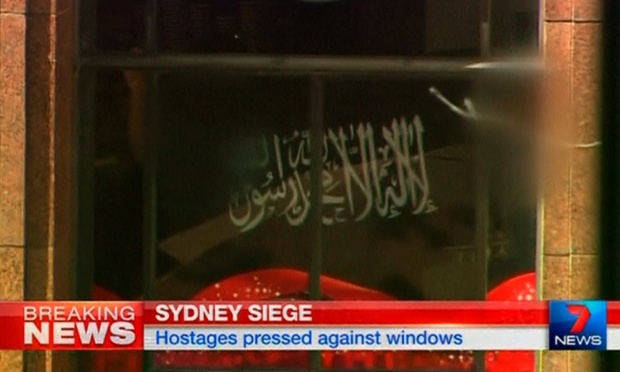IN THE MEDIA
First Person: Time to wake up
December 16, 2014 | Jeremy Jones

Jeremy Jones
Jerusalem Post, December 16
http://www.jpost.com/International/First-Person-Time-to-wake-up-384761
SYDNEY – On a beautiful Sydney summer’s day, with clear blue skies and a gentle sea breeze, the breakfast-time news led with a report of an early morning police raid and arrest of a 25-year-old man charged with financing terrorism.
The Australian Federal Police announced the arrest was the result of “continuing investigations into the planning of a terrorist attack on Australian soil and the facilitation of travel of Australian citizens to Syria to engage in armed combat,” promising more information would be made public at an 11 a.m. media conference.
That media conference never took place.
At 9.45 a.m., Christmas (and Hanukka) shoppers, business people, tourists and others in the heart of Sydney’s retail and commercial district witnessed the deployment of a huge police contingent, accompanying emergency vehicles and a media pack descend on Martin Place, a central location close to train stations, bus stops, banks, parliament and commercial television headquarters.
A few minutes earlier, a gunman had entered a popular, upmarket coffee and chocolate shop, run by the elite Lindt chain.
Staff and customers were taken hostage, and a large banner declaring allegiance to Islam was unfurled, straight under and in stark juxtaposition to the shop window’s “Merry Christmas” sign and messages of goodwill for all and seasonal cheer.
Armed hostage taking is extremely rare in Australia, and armed hostage taking accompanied by a banner that evoked images of Islamic State, al-Qaida or other groups known for their inhumanity, barbarity and callous disregard for morality and decency, is unprecedented.
Scores of Australians have left these shores to join one or other of the groups fighting in Syria and Iraq, and we receive regular media coverage of brutality, murder and human rights abuses that these self-declared jihadists boast they are committing.
Images of young men and women who abandon comfortable family homes to enlist in terrorist fighting groups, or to marry “martyrs,” have been complemented by visions of an Australian man having his young, Australian, child, proudly hold the severed head of a murdered opponent.
In the past few months, there has been a series of arrests in Australian cities of men and women involved in planning terrorist acts in Australia, or supporting terrorist groups abroad. Among the disrupted activities, it has been alleged, were plans to behead a random civilian in central Sydney.
The immediate reaction to the news of Monday’s incident was one of fear – an Islamic State acolyte had captured an unknown number of men and women, who faced an unknown, potentially terrible fate. Within minutes, rumors abounded that the same man, or his associates, had planted explosive devices at Sydney icons such as the Opera House, that bombs were distributed along busy streets, that train stations were to be avoided, and that there were threats to institutions and individuals throughout the city.
Adjoining buildings were put in lockdown, then evacuated when it was felt safe to do so.
The perimeter grew ever larger, with many institutions beyond the immediate area also sending staff home.
Families waited for assurances from children and parents that they were out of harm’s way, public institutions and the Jewish community ratcheted up levels of security, with many organizations deciding the prudent behavior was to close for the day.
After a short time, academics and other authorities determined the banner was not of Islamic State, but agreed it was Islamic. The media refused repeated supplications from the gunman to broadcast his demands, denying him a platform, let alone a megaphone, but also giving oxygen to a broad spectrum of theories and presumptions.
Fears that the city was riddled with terrorists or terrorist devices were assuaged, and the police eventually declared that the problem was in a specific locale and should not impact on the rest of Sydney.
Religious and community leaders mixed expressions of concern for the hostages with cautions against racism, bigotry or vigilantism.
Within hours of the news breaking, thousands of Australians had affiliated with a social-media based movement that told Muslims that the rest of us “had their back” and would stand with them against any manifestations of bigotry.
Vigils and interfaith services were convened at churches, synagogues, mosques and temples, while news broke of two, then three, then five hostages escaping from, or being freed by, the gunman.
National and state political leaders made a series of public appearances, expressing concern for hostages, applauding the work of the police and reinforcing the message that Muslims, as with all others, held the gunman in contempt and sought the safe, speedy resolution of the situation.
The siege ended in tragedy, with two of the hostages dead as well as the gunman, who it has been revealed was a self-styled sheikh, who had in the past sent this writer, and many others, offensive and hateful mail and faxes.
The gunman was well-known to police and the Sydney public, and early commentary was to the effect that the action came as a shock, but not a surprise.
In our beautiful city, on a beautiful summer’s day, something very ugly took place. Regardless of what emerges from the hostage-taking, Sydneysiders have become abundantly aware that any one of us, at any time, could be the victim of terrorists.
Jeremy Jones AM is senior contributing editor of the Australia/Israel Review. He chairs the Australian National Dialogue of Christians, Muslims and Jews and serves on the NSW Police Multicultural Advisory Council
Tags: Australasia





